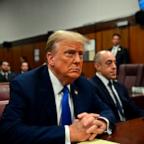Playing Brinksmanship With Iran?
April 29, 2006— -- In a new report, the United Nations concludes Iran is moving ahead with its nuclear program, continuing to make fuel that could be used in nuclear bombs and continuing to defy the United Nations.
During the last 30 days, Iran has conducted three separate missile tests, promised Sudan it will share its nuclear technology and announced an expansion of its uranium enrichment program.
"They really are engaged in their own Manhattan project," said Marc Gerecht of the American Enterprise Institute. "And they are deadly serious about this. And it would be foolish to underestimate their capacity and their will here."The stage is set for a showdown at the U.N. Security Council showdown over a resolution to punish Iran.
Before an enthusiastic crowd in northwestern Iran Friday, President Mahmoud Ahmadinejad, declared, "The Iranian nation won't give a damn about such useless resolutions."
Ahmadinejad was elected last year and is Iran's first non-cleric president in nearly a quarter of a century. He is regarded as a hard-line fundamentalist. And, according to Iran expert Reza Aslan, the Iranian people and politicians are starting to realize that their president may be leading them on a collision course.
"Like all politicians, [he] is speaking to his constituency, not to us," said Aslan, a fellow at the University of California at Santa Barbara, and author of a book on Islam called "No God But God."
Aslan said the previous Iranian president is trying to create a more centrist program and that people are beginning to see that Ahmadinejad's fiery rhetoric is moving them further away from being able to obtain a nuclear program.
"I think the reason the diplomacy hasn't worked is that the wrong people are engaged in it," said Aslan. "Iran has said it is willing to negotiate over the nuclear impasse, but only to do so directly with the United States."
World Divided
Foreign ministers of the five permanent members of the U.N. Security Council plus Germany will meet on May 9 to discuss a united response to Iran's defiant pursuit of a nuclear program. The United States, backed by Britain and France, favors limited sanctions if Iran refuses to stop enrichment quickly, but Russia and China, the other two veto-holding permanent Security Council members, oppose the strategy. Both nations have high stakes in Iran's energy industry.




